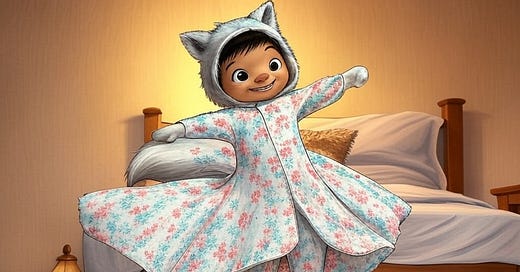The Night Max Put on His Wolf Dress: The Forgotten Wisdom of Maurice Sendak
A gender riff on Where the Wild Things Are
The Night Max Put on His Wolf Dress
And made mischief of one sort
And another,
His mother said, “Go to your room!”
So, Max went to bed without his supper.
When I was a child, I thought Where the Wild Things Are was magical—but a little boring. I spent hours imitating Sendak, drawing my own boat, my own Wild Things and imagining my own extended adventures.
I was not as enamored with the story itself…
That night in Max’s room, a forest grew
And grew.
And Max decided to sail away.
So, he climbed into his pink and blue boat and sailed away until he came to the place where the Wild Things are.
When they saw him, they gnashed their terrible teeth and rolled their terrible eyes until Max tamed them with the trick of staring into their eyes.
Then Max declared himself queen of all the Wild Things and commanded them to call him “Justine.”
“Let the Rainbow Ruckus begin! By order of Queen Justine!”
And just like that, the Wild Things began bringing out big, fancy hats and long, fancy dresses.
Max put on the biggest hat and the longest, most colorful dress of all. Then he danced all night under the pink and blue moon.
But later that night, after all the Wild Things were fast asleep, Max felt lonely and wanted to go where someone loved him best of all.
When the Wild Things woke up and saw that he was leaving, they gnashed their terrible teeth and rolled their terrible eyes. They grabbed his dress and bound his legs and arms with strings of beads. “Queen Justine!” they cried. “Don’t go! We’ll eat you up, we love you so!”
But Max said, “No.”
It was all a bit dull—Max visits the Wild Things, tames them, throws a wild party, and returns home. Surely there were other lands to visit? Other stories to tell? In retrospect, on the far side of my children’s childhood—and my own—the book makes more sense. For children it’s a prompt for imagination. For adults it is a reminder of the dream-like quality of children’s beliefs, how they throw themselves wholeheartedly into their fantasies. Childhood fantasies are simple, like the story —episodes, not epics or journeys leading anywhere in particular, remote from the adult world. Each is a brief, exuberant ruckus, a wild and free moment that lasts until they tire of the game and long to be where someone loves us best of all.
In the real book, Max’s fantasy was not about gender, but it easily might have been. The Wild Things are every sort of animal combined: cockatoos, buffalo, bears and foxes. Why not a queen? But importantly, it is Max who tames the Wild Things, Max who begins the wild ruckus, and Max who, when they threaten to eat him up, tells them, “No.”
It is not for grown-ups to launch the boat or dance along with the wild ruckus. Our role is to hold space for our little wild things: with a childhood expansive enough to grow a forest or to dance under the moon, but also, like Max’s room, with a someplace where they can return when their fantasy has run its course.
Then Max took off the fancy hat and the long dress and pulled off the strings of beads. He got into his pink and blue boat and sailed away until he woke in his own little bed, in his own room, where his mother had left his dinner for him.
And it was still hot.
Genspect publishes a variety of authors with different perspectives. Any opinions expressed in this article are the author’s and do not necessarily reflect Genspect’s official position. For more on Genspect, visit our FAQs.







There are so many lessons from so many children's books that could have inoculated us all against this madness -- The Emperor's New Clothes, Little Red Riding Hood, Free to be You and Me -- but yet here we are having to fight for reality and the true protection of young, vulnerable people.
Why exactly would this kind of book be suitable for small children? Why do they need a book about cross-dressing, even innocent cross-dressing (such behavior would, if unprompted by others (especially adults) be innocent)? And name changes? What's that about? Why a book about cross-role-playing? How is calling Max a "queen" any different than the linguistic nonsense of preferred pronouns? I'm mystified.